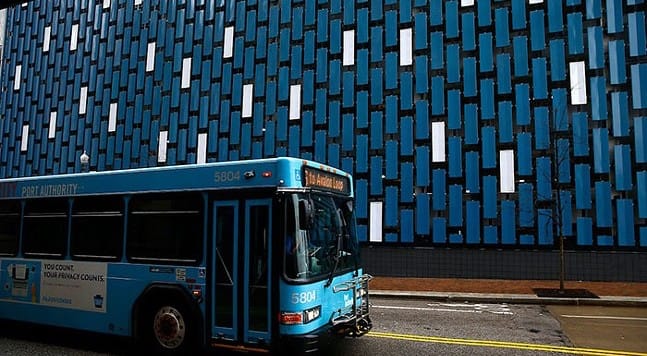
On April 16th, PPT held a press conference with ATU Local 85, Rep Jake Wheatley, TransitCenter and local transit riders to call for hazard pay to transit workers, and increased transit service. Check out the coverage below:
“Pittsburghers for Public Transit calls for increased bus frequency, hazard pay for workers” by Hannah Lynn at PGH CityPaper
[…]
A virtual press conference held by PPT began by playing the song “Essentially Expendable (The Death of Jason Hargrove)” by David Rovics, which was written for Detroit bus driver Jason Hargrove, who died of COVID-19. It was followed by a moment of silence for the dozens of transit workers across the country who have died of COVID-19.Business manager and president of the Amalgamated Transit Union (ATU) Local 85 Steve Palonis gave an updated count on transit workers tested for COVID-19; there are 47 pending results, 19 negative results, and four that have tested positive. He outlined all the ways transit workers are implementing protections and restrictions, but called for greater action from authorities to compensate workers.
“The public and our government’s commitment to frontline workers needs to be extended beyond accommodations and thanks,” said Palonis. “Transit workers deserve compensation for the serious risk they’re taking along with the essential employees.”
He called on Sen. Pat Toomey (R-Lehigh) and other legislators to support the Heroes Fund proposed by Sen. Bob Casey (D-Scranton) to provide a pay increase for essential workers and recruitment incentives through December 2020. Palonis also called for support for House Bill 2380, proposed by Rep. Jake Wheatley (D- Hill District).
Wheatley, who appeared at the virtual press conference, said that HB 2380 would increase wages for essential workers, including raising pay to $15 an hour for employees currently making less than that. Those making $15 an hour or more would make an additional $3 per hour.
“We just really appreciate the workers and what they’re doing to make all of us safe and to continue society, and we think we should support them financially and otherwise,” said Wheatley.
At the press conference, Turtle Creek resident Anna Hudson, who takes the 59 and P68 bus routes, spoke about her difficulty taking the bus to get groceries and other essentials, saying that by the time the already infrequent buses got to her part of town, they were often already full.
PPT executive director Laura Wiens, who hosted the press conference, commended Port Authority’s work to date but called for more action. She referred to Port Authority’s fareless transit as “an act of compassion … as much as it is an act of pragmatism.” She named bus routes that riders listed in a PPT transit survey as being overcrowded, many of which, Wiens notes, “serve Black and brown and lower-income communities, communities whose health outcomes have been hardest hit by COVID-19.”
Wiens underlined the importance of keeping transit safe for everyone, saying, “It’s not a stretch to say that our collective survival depends on the ability of our transit systems to continue to move effectively.”
Wiens also called for more equal access to services like food banks and virus testing since not all residents can use a car to wait in a long line at the food bank, or a way to use drive-up testing clinics.



















